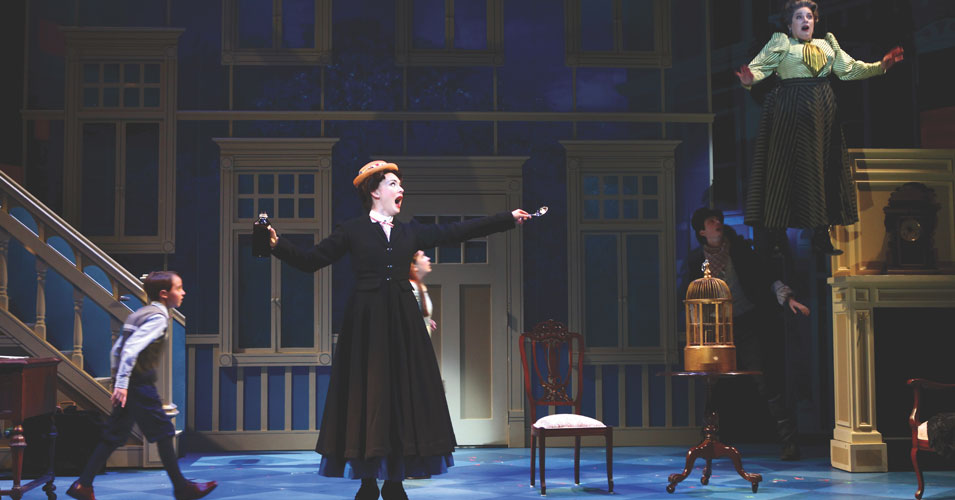Syracuse’s professional regional theater will break new ground this month with a performance of Mary Poppins geared toward the sensitivities of people with sensory, social and learning disabilities, including autism spectrum disorder.
Mary Poppins, a co-production of Syracuse Stage and the Syracuse University Drama Department, will be presented in a sensory-friendly performance on Saturday, Jan. 7, at 3 p.m. Tickets are $25 and include a 100 percent refund option right up to the start of the show. (At press time, tickets were selling briskly and might sell out by the time this story is published.)
“For us it’s not too much (work), but for the families it’s amazing,” said Kate Laissle, assistant director of education, in a telephone interview. “We’re meeting children and families where they’re at. We say it’s a ‘shush-free environment and a judgment-free zone.’ All families are welcome.”
Several adjustments will make the show more comfortable for people with sensory or related disorders. Syracuse Stage is selling about 100 fewer seats to free rows of the theater for people who need to move farther back. It is also setting up “chillout stations”: quiet rooms, equipped with monitors showing the performance, for kids, families and adults who need to leave the theater entirely and take a break.
There will also be a cadre of volunteers, including professionals such as special education teachers, to help audience members, in addition to the trained ushers. And Syracuse Stage is sending “social stories” to people who have purchased tickets to the performance.
Social stories are short descriptions of a situation that help people with autism know what to expect. For Mary Poppins, the staff is putting together two different social stories, about going to a play at Syracuse Stage and about going to Mary Poppins.
Putting on a sensory-friendly performance involved, first, getting the go-ahead from Bob Hupp, Syracuse Stage artistic director. “It is our hope to create a safe space where parents won’t need to worry about their child fidgeting, having to take a break when it’s not intermission or making noises during the performance,” Hupp said in a statement.
In addition, Laissle and other staffers worked with local experts on autism and related disorders, watched YouTube videos of sensory-friendly shows produced in other locations, and consulted with Roger Ideishi, a national expert on presenting sensory-friendly productions.
Ideishi is an occupational therapist Laissle referred to as “the Johnny Appleseed of sensory friendly.” He travels to performing arts organizations around the country, helping them adjust their presentations to fit the concerns of people with sensitivities to noise, crowds, bright lights, surprises or other features of live storytelling.
Sensory-friendly experiences have been presented by many cultural organizations across the country. Pittsburgh Ballet Theatre and several Broadway shows such as Wicked, Matilda and Phantom of the Opera have staged sensory- or autism-friendly shows. Locally, the MOST (Museum of Science and Technology) has for years held a monthly sensory-friendly evening at the museum.
Syracuse Stage also contacted self-identified adults on the autism spectrum, members of the Central New York chapter of the Autism Society of America, and several other experts and members of local organizations to get advice on how to put on its first sensory-friendly show.
“We wanted to make sure what we were doing was right for us,” Laissle said. “What’s good for New York City is not necessarily good for Central New York.”
Ideishi, who attended a daytime school performance of Mary Poppins, explained that the effort to stage a sensory-friendly performance is a lot of buildup for a very subtle effect. He has known families to leave a show after 20 minutes, he told Laissle. At the time, he asked them if they left because they didn’t enjoy the show, but the families said, “No, that was great. Next time we hope to last half an hour.”
A small—and yet huge—benefit is that the show will give families the chance to be at the theater together, instead of someone having to stay home with one of the children.
The endeavor, Laissle said, has impressed her for “how much the whole building is excited for this piece, from the directors to the cast members. Everyone at Syracuse Stage is involved in some way and is really thrilled.”



